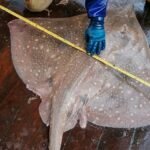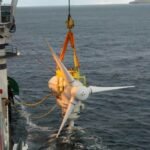Heavy rain triggers flood warnings and road closures
Scotland is facing more wet weather after a weekend of record-breaking rainfall that caused landslides, floods and disruption across the country. The Met Office has issued a yellow weather warning for rain for parts of western Scotland until 9pm on Tuesday, saying there is a small chance of further flooding and travel disruption. Some roads, including the A83 in Argyll and Bute, remain closed due to landslips and damage. The Scottish Environmental Protection Agency (SEPA) has also issued 16 flood warnings and nine flood alerts for various areas.
Missing man search continues as police use drones
Police Scotland are continuing to search for a 77-year-old man who was reported missing from the Strathtay area on Sunday. The man was seen in the River Tay near Strathtay at about 5pm on Sunday and a search operation was launched involving police, fire and rescue, coastguard and mountain rescue teams. On Monday, police used a helicopter and drones to look for the man, but he has not been found yet. Police said they are concerned for his welfare and urged anyone with information to contact them.
Arctic wind brings cold snap and snow
After the wet weather, northern parts of Scotland could see the first snow of the season as Arctic wind is forecast to bring freezing temperatures below the averages for this time of year. STV weather presenter Philip Petrie said some spots saw nearly a month’s worth of rainfall in just 24 hours on Saturday and Sunday, but the weather will turn colder and drier from Wednesday. He said there will be an increased chance of snow on higher ground, and possibly even on lower levels on Orkney and Shetland. He advised people to wrap up warm and be prepared for icy conditions.

Scientists investigate new superconductor claim
A team of physicists from South Korea has claimed to have created the first room-temperature, ambient-pressure superconductor, a material that would conduct electricity without resistance or loss of energy. The team said they created the material, called LK-99, by mixing lanarkite (Pb 2 SO 5) and copper phosphide (Cu 3 P) in a sealed vacuum tube. They said they measured the electrical and magnetic properties of LK-99 and found it showed zero resistance and the Meissner effect, two signs of superconductivity. They also provided a video of the material partially levitating above a magnet.
However, their claim has not been peer reviewed or replicated by other researchers, and there is much skepticism in the scientific community. There have been previous false claims of room-temperature superconductors over the past few years, and the team has not provided enough details or evidence to support their claim. If their claim turns out to be true, it would be one of the biggest breakthroughs in physics history, as it would revolutionize the fields of electricity and electronics.
How will Scotland cope with the extreme weather?
The weekend’s record-breaking weather has shown how vulnerable Scotland is to the effects of climate change and extreme weather events. The heavy rain caused landslides, floods, road closures, power cuts, travel disruption and risked lives. The cold snap could bring more challenges such as snow, ice, frost and freezing fog. The Scottish government has said it is working with local authorities and emergency services to ensure public safety and minimise disruption. However, some experts have warned that Scotland needs to do more to adapt to the changing climate and invest in infrastructure, resilience and mitigation measures.
Will Scotland be able to handle more weather shocks in the future? Or will it face more damage and disruption? The answer may depend on how well it prepares for the worst.


















